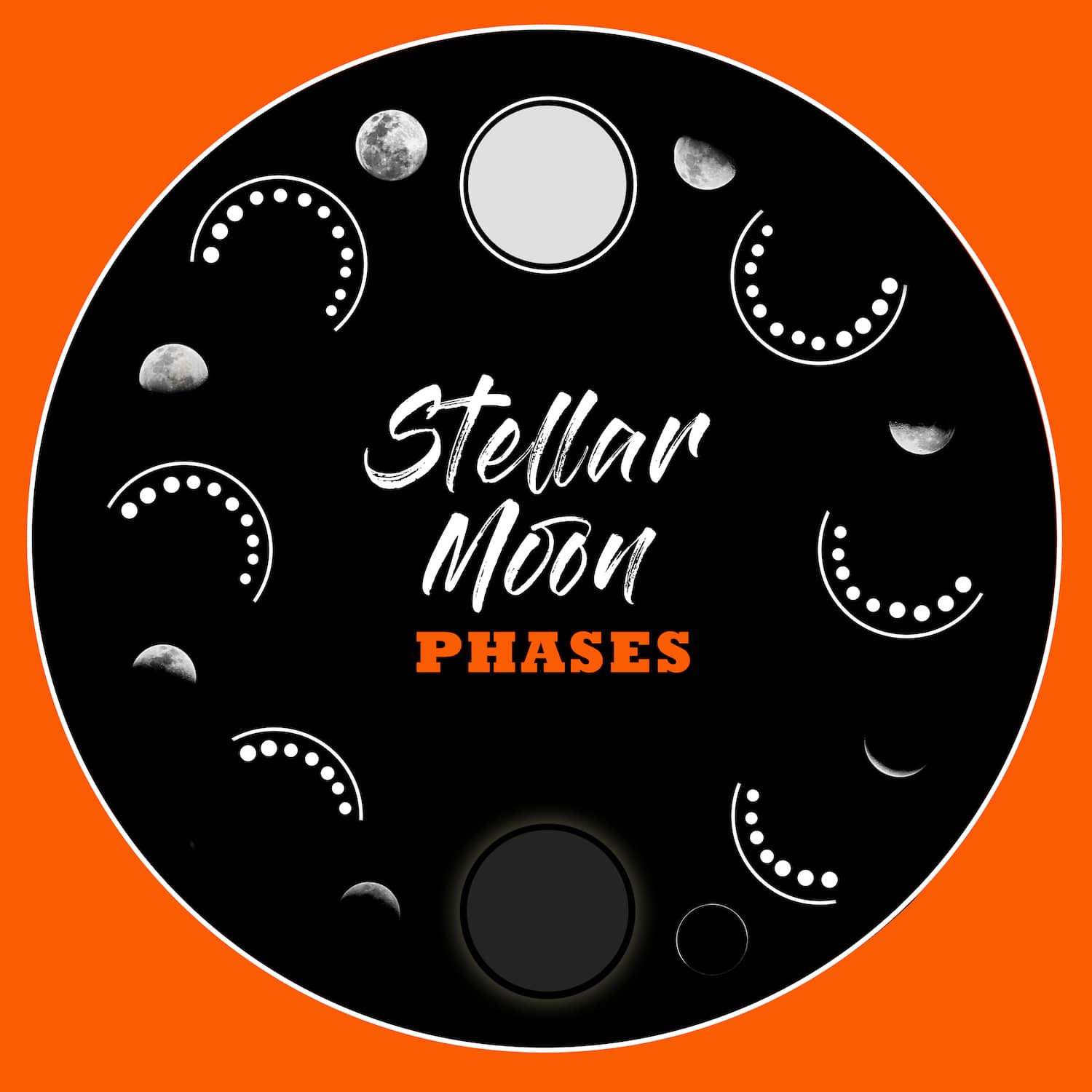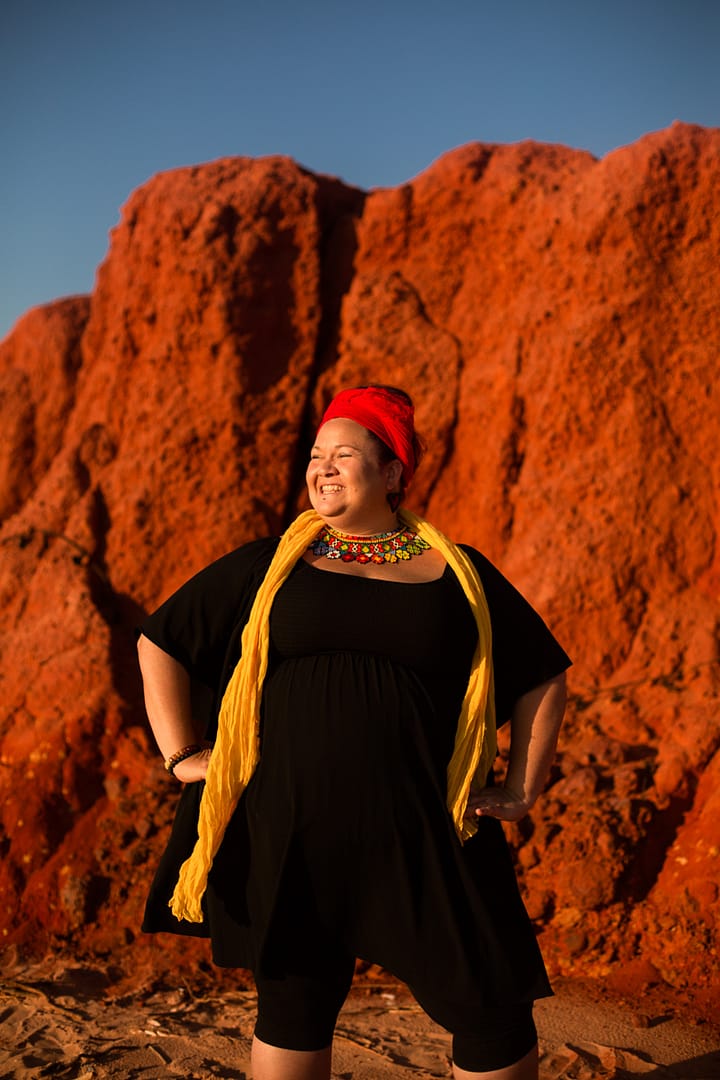Words by Kate Lockyer
Hailing from the ancient lands of the Kimberly, proud Nyikina Jarndoo (woman) and First Nations artist Stellar Moon is releasing ‘Phases’, her debut album, on March 7. Both a musician and visual artist, with this album Stellar paints a vivid image of what it is to be a First Nations person in Australia. Her soulful delivery, with dashes of funk and rock, and story-teller lyrics, woven through with lines in Nyikina Nganka (or Nyikina language), grab your hand and compel you to walk with her through the cycle of the moon.
Stellar Moon has toured Western Australia extensively and supported Australian greats such as Daryl Braithwaite and The Waifs. Stellar Moon says she shares her songs to awaken the power within so listeners may rebel enough to question the status quo, stand up for their country, fall radically in love with themselves and learn to live in unapologetic full expression of themselves.
Filled with songs inspired by her journey of healing and empowerment, Stellar says of the album: “Just like the Moon, we all go through patches of both darkness and luminance in life, sometimes we bask in the light and sometimes we hang out in the shadow. It’s all needed and important. No matter what phase we are in, like the Moon, we are still always whole.”
Each song corresponds to a phase of the moon’s cycle, and the first song, Mundajarra, is set in the New Moon phase. Stellar says the album begins with one of their dear Nyikina elders, Jeannie Wabi, singing out in language ‘hurry up everyone, come here now, hurry up!’ Mundajarra is a call to people to take their life by the reigns. The song is groovy, mid-pace, and I picture Stellar walking purposefully towards her best life, belting out “we drive our own destiny” in her earthy, rich voice. The last few choruses also have Stellar singing in Nyikina language, and given we know now what she is singing about, as a listener we can lean back and appreciate the power that flows through this lyrical statement, or, better, get up and dance along!
Chains, written in a slow tempo to symbolise the restraint of the chains she sings of, is set in the Waxing Crescent phase of the moon. Emerging from the shadows, this encapsulates the determination we hear in the song. Ponderous, swinging guitar and Stellar’s deep vocals build to the pre-chorus, where harmonising ‘oohs’ give the song a Gospel feel, before bursting into the chorus with “Take off these chains / Walk a little further now… / Remember your name / Where you come from / And you’ll be free”. Songs like these highlight the beauty of multilayered understandings of the lyrics – Stellar says she was moved to write the song when deciding whether to quit her day job and follow her dreams, but the song also touches on themes of colonisation and its continuing effects on Indigenous peoples.
Inspired by her work as a life coach and sound healer, and the stories and experiences of her students and clients, ‘Phases’ is steeped in Stellar’s journey of healing and empowerment. “Singing has always been my absolute favourite thing to do. It’s my freedom. Writing is a close second. It’s helped me cry many tears. Performing is how I connect to the world and share an experience or an insight,” Stellar says.
The next track takes the determination and strength of Chains and channels it into the funky sass of Out of the Dark, in the growing energy of the First Quarter Moon. She says this track is inspired by the students she taught. “I never met a child I didn’t like, some of these kids ended up in trouble but I know there’s no such thing as a ‘bad kid’… When I wrote this it was also when the ‘raise the age’ campaign began.
I think it’s horrific that we lock up children as young as 10 years old when we should be offering more support and trauma based healing on country.” The foot-tapping electric guitar riff, bluesy organ, and flute that flutters as a response to Stellar’s voice create a defiant and hopeful soundscape for the song.
By The Fence shifts focus, to tell the story of another minority within Australia – refugees in detention. Sparse electric guitar notes ring out as Stellar sings the story of people far from home, but who hope for something better. “All we ever wanted was to find a little piece of peace”, she sings poignantly. Part of the Waxing Gibbous Moon phase, the ballad reaches for something close to coming to fruition, like the moon almost full, like the asylum seekers so close to being able to start a life in Australia.
The next track, Bawoona Balinka (‘Come’ and ‘Go’ in Nyikina Nganka) sits outside the phases of the moon, and is what Stellar depicts as a spiral, because it is about Bookarrarra (Dreamtime). Kicking off with a blast of brassy ascension, we are plunged emphatically into a lively celebration of the Dreaming, which Stellar says to Indigenous Australians is everything and everywhere, the past, the present and the future. A buzzy and energetic guitar and keyboard solo partway through certainly heralds the image of a spiral, as we spin around in the song.
Rise, the Full Moon song, is just as celebratory, filled again with uplifting instrumentation like horns, tambourines and enthusing backing vocals. You can’t help but jive along and let Stellar’s powerful voice carry you away. She says, “It’s an anthem to all the times we fall, or feel like we are drowning, or when we’ve gone the wrong way down the wrong track, and trusting that we will make it through.”
As we reach the Waxing Gibbous Moon, the pace slows down again, this time pausing to see what we must do to heal with Lightning. Trusting in the plan this world has for us, and trusting in ourselves, the song reveals the grit – and lightning – we have inside us to draw on. The slight growl and grit in Stellar’s voice as she sings “I’m bringing the lightning” brings this idea home.
Stellar says Forrest Dreams, in the Last Quarter Moon, is all about dreaming and manifesting. This steady, reflective atmosphere is created in the song with leisurely instrumental, including a fabulous, spontaneous-sounding trombone solo. The song is also about experimentation and not accepting limitations, and Stellar takes on this theme with a rap verse, saying, “We take reality for truth, so much of it is fallacy”. I can see her sharing this power and energy with her students, something I’m sure must have fed into the song.
The Waning Crescent brings with it Still Tea, which is Stellar’s response to a lifetime of being questioned about her identity due to her skin colour. She says, “Did you know they say the Waning Crescent phase is like the pre-menstrual phase? When we are very powerful, got no time for the BS and we are ready to call it how it is.” The song sees her in her full power, with a vocal chorus behind her, backing her up. Simple chords frame her words, with brass and organ riffs in between. The title of the song is based on a saying among First Nations people; “No matter how much milk you pour in the tea, it’s still tea”. The feisty track challenges us to do better, a speak out for what is right.
The last track, Run, is a lively song but has a darker undertone, being part of the Dark Moon phase. Even though the song is about running away from things you don’t like, the negative connotations are flipped, because in this case it is about running towards something better for yourself. A bouncy drumbeat, tracing the thudding of her steps, and vocals that once again show off Stellar’s raw and intense tone for a powerful finish to the album.
‘Phases’ is a strikingly carried out concept album that follows a cycle of renewal, healing, and finding confidence, while also being a joyful celebration of First Nations culture and identity. A beautiful listen for all Australians who want a window into the world of our Indigenous people – and for anyone looking for a soulful, uplifting listen.
Thanks to This Much Talent












